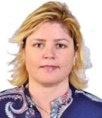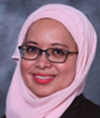(https://doi.org/10.55612/s-5002-041)

Sylvester Arnab
as a Professor of Games Science, his research interests include the application and impact of game science (applied games, serious games, gamification, game-based learning, game design thinking, playful learning) in teaching and learning, and other domains. To date, Sylvester has over 90 academic publications, including one edited book- Serious Games for Healthcare. He has also keynoted at events related to serious games, gamification and technology-enhanced learning. He is a founding member of the Serious Games Society (seriousgamessociety.org/). Sylvester has also co-founded the GameChangers initiative (http://gamify.org.uk) on game design thinking and playful learning that has produced open game-based learning resources and methodologies, which has been adapted and adopted by others in other countries, including France and Malaysia. To date, Sylvester has successfully won projects with a total value of £19 million since 2010 including FP7, H2020, Erasmus+, NEWTON and HEFCE. He has coordinated and led the Beaconing project (beaconing.eu) funded by the European Union’s Horizon 2020 Research and Innovation Programme under grant agreement No 687676 (€5.9 million, 15 partners, 3 years), HEFCE funded Mobile GameChangers and NEWTON (AHRC + MoHE) CreativeCulture project.

Abdelwahed Berguiga
is an assistant professor at Higher Institute of Computer Science and Mathematics of Monastir, University of Monastir, Tunisia. He received the Engineering degree in Computer Science from the Higher Institute of Computer Science and Communication (ISITCom) of the University of Sousse, Tunisia in 2007 and a Master of Sciences in Computer Science from the Faculty of Sciences of the University of Monastir, Tunisia in 2009. In 2016, he received a Ph.D. in Computer Science from the University of Manouba, Tunisia. He is a member of PRINCE research Lab, ISITCom, Tunisia. From 2017, Abdelwahed is an assistant professor at Jouf university, Saudi Arabia. His current research interests are in the field of Internet of Things with particular interest in mobility management, service migration and Quality of Service provisioning in IoT.

Abdelwahed Berguiga
is an assistant professor at Higher Institute of Computer Science and Mathematics of Monastir, University of Monastir, Tunisia. He received the Engineering degree in Computer Science from the Higher Institute of Computer Science and Communication (ISITCom) of the University of Sousse, Tunisia in 2007 and a Master of Sciences in Computer Science from the Faculty of Sciences of the University of Monastir, Tunisia in 2009. In 2016, he received a Ph.D. in Computer Science from the University of Manouba, Tunisia. He is a member of PRINCE research Lab, ISITCom, Tunisia. From 2017, Abdelwahed is an assistant professor at Jouf university, Saudi Arabia. His current research interests are in the field of Internet of Things with particular interest in mobility management, service migration and Quality of Service provisioning in IoT.

Clodis Boscarioli
is DSc in Electric Engineering from São Paulo University. He is a senior lecturer at the Western Paraná State University (Unioeste), campus de Cascavel, and is a member of the Graduate and Undergraduate Computer Sciences Programs, and professor of the Science Education and Mathematical Education Postgraduate Program. His research areas include: Information Systems, Database Systems, HCI, Computational Learning, Data Mining, Assistive Technologies for Teaching & Learning Processes, and Computing Education.

Rafik Braham
is currently a professor of computer science at ISITC of Hammam Sousse, the University of Sousse. He is the head of the research group PRINCE. He received a PhD degree from Georgia Institute of Technology in 1990. His research interests include learning technologies, neural networks, wireless networking (MAC and PHY), Internet-based services and automatic processing of Arabic language. R. Braham is a member of IEEE and IEEE Computer and Education societies.

Rafik Braham
is currently a professor of computer science at ISITC of Hammam Sousse, the University of Sousse. He is the head of the research group PRINCE. He received a PhD degree from Georgia Institute of Technology in 1990. His research interests include learning technologies, neural networks, wireless networking (MAC and PHY), Internet-based services and automatic processing of Arabic language. R. Braham is a member of IEEE and IEEE Computer and Education societies.

Lilia Cheniti-Belcadhi
is an associate professor of Computer Sciences at the Higher Institute of Computer Sciences and Communication Technologies, University of Sousse, Tunisia, and a graduate of the University of Braunschweig in Germany where she read for an engineer and master’s degree in Computer Sciences. She is a member of the PRINCE Research Lab at the University of Sousse and was associate researcher at the Computer Science department at Telecom Bretagne, Brest in France. Her PhD was realized in collaboration with the Semantic Web group at the Institute of Information Systems of the University of Hannover in Germany. She has also a diploma of « Habilitation à Diriger des Recherches » (HDR) in Computer Sciences. Her research interests include Technology Enhanced Learning, Semantic Web and E-assessment and Elearning Expert at AUF (Agence Universitaire de la Francophonie). She is involved, as part of her ongoing research, in several e-learning projects and has co-authored various online courses and a Massive Open Online Course (MOOC) on Object Oriented Modeling of Computer applications. She is currently head of online learning department at her University.

Lilia Cheniti-Belcadhi
is an associate professor of Computer Sciences at the Higher Institute of Computer Sciences and Communication Technologies, University of Sousse, Tunisia, and a graduate of the University of Braunschweig in Germany where she read for an engineer and master’s degree in Computer Sciences. She is a member of the PRINCE Research Lab at the University of Sousse and was associate researcher at the Computer Science department at Telecom Bretagne, Brest in France. Her PhD was realized in collaboration with the Semantic Web group at the Institute of Information Systems of the University of Hannover in Germany. She has also a diploma of « Habilitation à Diriger des Recherches » (HDR) in Computer Sciences. Her research interests include Technology Enhanced Learning, Semantic Web and E-assessment and Elearning Expert at AUF (Agence Universitaire de la Francophonie). She is involved, as part of her ongoing research, in several e-learning projects and has co-authored various online courses and a Massive Open Online Course (MOOC) on Object Oriented Modeling of Computer applications. She is currently head of online learning department at her University.

Katrien Dreessen
is a researcher at the Social Spaces research group (research unit ‘Inter-Actions’, LUCA, school of arts/KULeuven) and teacher at LUCA, School of Arts in Genk. She graduated from the Vrije Universiteit Brussels with a master in communication sciences. As coordinator of FabLab Genk, she is very much interested in the wider role of these digital fabrication spaces in society. Research-wise, she has been involved in several international and national projects that are situated on the intersection of design research, healthcare and maker culture. Currently, she is finishing her PhD research on how long-term participation of non-expert users in open spaces (i.e. Fablab and Living Labs) can be stimulated and achieved.

Danilo Giglitto
is a postdoctoral researcher working in C3RI on the CultureLabs project, aimed at developing novel methodologies and digital tools that can facilitate the organisation and wider deployment of participatory projects around cultural heritage, focusing on the social inclusion of disadvantaged groups, and particularly of migrant communities. Before joining Sheffield Hallam University, he was a Research Associate at Kingston University London working on the Hilali Network, a transnational collaboration exploring the convergence between current reforms in Egyptian higher education sector and a local community-led action of digital documentation of intangible cultural heritage. Prior to that, he was a PhD student at the University of Aberdeen funded by the “Cultural Heritage and Digital Society” scholarship. From 2013 to 2015, he was affiliated with the CURIOS project (dot.rural Digital Economy Research Hub) focusing on encouraging grassroots participation in local heritage. Danilo’s doctoral research explored the use of wiki software for the creation of community-led intangible cultural heritage projects as a way to achieve an affordable and sustainable interactive digital presence for historical communities as well as an empowering tool for local communities. His research interests include: human-computer interaction, ethnography, intangible cultural heritage, digital heritage, crowdsourcing, community engagement, community empowerment, and bottom-up approaches.

Ahlem Harchay Berguiga
is an assistant professor at Higher Institute of Computer Science and Management of Kairouan, University of Kairoaun, Tunisia. In 2007, she received the Engineering degree in Computer Science from the Higher Institute of Computer Science and Communication (ISITCom) of the University of Sousse, Tunisia and a Master of Sciences in Computer Science from the Faculty of Sciences of the University of Monastir, Tunisia in 2009. She holds doctoral degree in Computer Science from the University of Manouba, Tunisia in 2016. She is a member of PRINCE research Lab, ISITCom, Tunisia. From 2017, Ahlem is an assistant professor at Jouf university, Saudi Arabia. Her current research interests are in the field of Technology Enhanced Learning, Semantic Web, Mobile Learning and Mobile Assessment.

Rachael Ka’ai-Mahuta
is of Maori (Ngati Porou, Ngai Tahu), Hawaiian, and Cook Island Maori descent. She is a Senior Lecturer at the Auckland University of Technology (AUT) where she is based in Te Ipukarea Research Institute as an Associate Director. Rachael completed her doctorate in 2010 and commenced work at AUT in 2011. Since then, Rachael has been awarded a Te Wheke-a-Toi Post-Doctoral Fellowship, completed a certificate on Indigenous Peoples’ Rights and Policy at Columbia University, graduated from Te Panekiretanga o Te Reo – the Institute of Excellence in the Maori Language, and completed a term as a Commissioner to the New Zealand Library and Information Advisory Commission. Rachael’s research interests include: the revitalisation of her Indigenous languages, traditions, and knowledge systems; digital technology for the preservation and dissemination of Indigenous knowledge; Indigenous Peoples’ rights; and the politics of identity and place, especially in relation to the Pacific diaspora.

Márcia Regina Kaminski
is master’s in teaching from the Western Paraná State University (Unioeste). Currently, she is a PhD student in Science Education and Mathematical Education at the same university. Since 2004, she is Computer Instructor in the municipal school system of Cascavel. Their research interests involve the use of Digital Games and Virtual Environments for teaching and learning, the Computational Thinking, the Teaching of Mathematics, Educommunication and Sustainability.

Shaimaa Lazem
s an academic researcher at the City of Scientific Research and Technology Applications (SRTA-City), a research institute in Alexandria, Egypt. She earned her PhD in Human-Computer Interaction (HCI) from Virginia Tech, USA, 2012. At SRTA-City she established a research program in human-computer interaction (HCI). Her research interests include participatory design, cross-cultural collaborations, post-colonial computing, and decolonizing HCI. Her previous projects included designing low-cost education and health technologies and applying learner-centered and flexible learning pedagogies for teaching computer science and HCI. Lazem has experience working with rural communities. She is the Egyptian lead of a UK-Egypt project to engage Egyptian Bedouins in self-documenting their intangible heritage using mobile phones. She was recently awarded the Leaders in Innovation Fellowship with the Royal Academy of Engineering in London to design an archival platform for marginalized communities to self-document their indigenous knowledge. Lazem is the Chair of the Cairo ACM SIGCHI Professional Chapter in Egypt (CairoCHI) and the Co-founder of the ArabHCI community.

Marcos Lübeck
is DSc in Mathematical Education from the Paulista State University Júlio de Mesquita Filho (UNESP). He is an Assistant Professor at the Western Paraná State University of (Unioeste) in the Mathematics course and the Teaching Graduate Program. Has experience in Mathematical Education, focusing on relations between History, Culture, Mathematical Education and Teacher Education.

Jacey-Lynn Minoi
is currently a Senior Lecturer at the Faculty of Computer Science and Information Technology, Universiti Malaysia Sarawak (UNIMAS). She joined the faculty in 1999. She received her PhD in Computer Engineering from Imperial College London, the UK in 2009. Dr Minoi is also a Research Fellow at the Institute of Social Informatics and Technological Innovations. Late 2009, she was granted to do her postdoctoral under the Wellcome Trust, UK, at the Royal College of Surgeons in Ireland and Glasgow University, UK. She is also a member of the ACM and IEEE Computer Society. Her research interest lies in the field of computational multivariate statistical methods for numerical data analysis applications such as biometric recognition, face analysis, medical imaging, surveillance and security.

Fitri Suraya Mohamad
teaches at the Faculty of Cognitive Sciences and Human Development, Universiti Malaysia Sarawak (UNIMAS), Malaysia. In over twenty years in UNIMAS, she has taught and supervised students on topics related to teaching and learning, particularly in the use of technology to support and enhance learning. Fitri is currently involved in teaching and training Masters and PhD students and local Sarawak teachers to use Gamification as an indigenous and creative approach to engage young school children to learn and focus in class, especially those in remote and rural locations in Borneo.

Luca Morini
is a Research Associate at the Centre for Global Learning, Education and Attainment (GLEA) at Coventry University. He holds a Master\'s Degree in Psychology and a Doctorate in Education and Communication, obtained researching into the social, cultural and pedagogical dynamics which occur in Do-It-Yourself amateur game design communities. His current research focus is on the opportunities and the pitfalls of the globalisation of Higher Education. His main areas of interest are participatory cultures (especially game cultures), critical pedagogy, and systems thinking. He has experience in qualitative research methodologies, particularly in participatory research and ethnography, seamlessly transversing online and offline spaces. Luca has a record of publications, including peer-reviewed journals, conference papers and book chapters, which touch on the diverse themes of digital and critical pedagogy, game design, human ecology, and research methodology.

Anne Preston
is Principal Teaching Fellow at University College London. She leads on the campus wide development of future facing curricula and academic development for UCL\'s new campus, UCL EAST.

Rhuan Guilherme T. Ribeiro
is master’s in teaching from the Western Paraná State University (Unioeste). Currently, he is a PhD student in Science and Mathematics Education from Maringá State University (UEM). He is a teacher of Mathematics and Physics at Guarani Indigenous School. Their research interests involve diversity issues in mathematics teaching, with interest in teaching in indigenous communities.

Sdenka Zobeida Salas-Pilco
holds a PhD in Education from The University of Hong Kong, and a Master’s degree in Educational Informatics (magna cum laude) from Alas Peruanas University, Peru. She received scholarships to undertake specialized professional development in South Korea, India, and Japan. She has also worked in the Ministry of Education in Peru as an Information and Communication Technology (ICT) Specialist. Her PhD research was on how ICT can be integrated in the curriculum of indigenous communities to stimulate interest, foster empowerment, and engender respect for local community knowledge. Her research interests include ICT policy, learning designs, creative and informal environments, and sociocultural approaches to learning and development.

Selina Schepers
is a design researcher at LUCA School of Arts (Genk, Belgium). She graduated as a Master of Philosophy (mPhil) in Cultures of Arts, Science and Technology at the University of Maastricht (the Netherlands). Since 2010, she is part of the Social Spaces research group (research unit ‘Inter-Actions’), specialized in participatory art and design research. Over the years she has coordinated and participated in various research projects that deal with participatory design processes involving children, such as ‘MELoDiA’, ‘SPEEL-Goed’ and ‘Making Things!’. In 2015, she started her PhD research (KU Leuven, Faculty of Social Sciences) on the design of methods, tools and techniques for participatory design processes involving children. Besides being a researcher, Selina also teaches within the Communication & Media Design program of LUCA School of Arts, campus C-mine.

Jessica Schoffelen
holds a master in Criminological sciences and a doctoral degree in Audiovisual Arts. She researches how to enable participatory processes that strive to tackle societal issues, be it sustainable or inclusive cities, mobility, citizenship or (health) care. Jessica was part of the coordinating team of TRADERS (FP7, Marie Curie Multi-ITN project) that focused on developing a methodological framework on which art and design researchers can rely when working on public space projects in participatory ways. She lectured on Art and Design research methods, open design and documentation and was a teacher in the master program Interaction Design at LUCA School of Arts. Here she was also part of the research group Social Spaces that explores the social qualities of design, art, new media and technologies. Currently she is working within the research group Inclusive Society (UCLL) wherein she further explores participatory action research and citizenship. From 2017 she is also connected to the faculty of Social Sciences of KULeuven (BE). She is a supervisor and co-supervisor in several PhD’s in the Arts and Social Sciences.

John Traxler
is a pioneer of mobile learning. He is Founding Director of the International Association for Mobile Learning. He is co-editor of six books including the definitive, Mobile Learning: A Handbook for Educators and Trainers, plus written many papers, editorials and chapters on all aspects of digital learning. He has been responsible for large implementations, small research interventions, capacity building, major evaluations and curriculum development. He is a frequent international speaker and has worked with international agencies and corporates.

Bieke Zaman
is associate professor and research group leader of the Meaningful Interactions Lab (Mintlab) at the KU Leuven, Belgium. She graduated from the KU Leuven in 2004 as a master in Communication Sciences (summa cum laude), obtained post academic degrees in Usability Design (2005) and Web Development (2007), and a doctoral degree in Social Sciences (2011, KU Leuven). Her research is situated at the intersection Human-Computer Interaction research and Communication Sciences. Bieke Zaman is the recipient of the KU Leuven Society Award Human Sciences 2018. She is associate editor of the International Journal of Child-Computer Interaction, steering committee member of the Leuven MindGate Programme Council Visionary Seminars (since 2018-present), and steering committee member of the 2019 Thinker Programme on Digital Innovation of the Royal Flemish Academy of Belgium for Science and the Arts. Bieke Zaman has an international reputation for her commitment to the organization of international conferences and networks, for instance being the vice-chair of the Children, Youth and Media Section of ECREA, the European Communication Research and Education Association and co-organizer of the yearly Interaction Design and Children conference.
